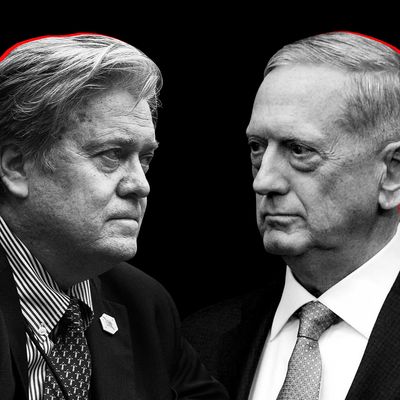
Secretary of Defense James Mattis is nicknamed “Mad Dog” — a reference to his love of swearing and killing enemy soldiers. He has said that “it’s a hell of a lot of fun to shoot” members of the Taliban, and told Iraqi military leaders, “If you fuck with me, I’ll kill you all.” The general was such a fervent opponent of the Iran nuclear agreement — and staunch proponent of covert confrontation with Tehran — President Obama relieved him of his duties in 2013.
But in the retirement home for Islamophobic cranks that is the Trump White House, James Mattis is the closest thing to a coolheaded, diplomatic dove.
The former general has already torpedoed Trump’s torture plans, defended NATO against the president’s slings and arrows, and, reportedly, pushed for the president to add exemptions to his ban on immigration from seven Muslim-majority nations.
And, through it all, Mattis has been serving as a kind of “equanimity translator” for the president — adapting Trump’s belligerent tweets into carefully worded diplomatic missives to calm our allies’ shaky nerves. Per the Washington Post:
In Seoul, Mattis told South Korean leaders that the United States will maintain a tough stance on North Korea’s nuclear and missile programs, predicting a lasting partnership despite Trump’s repeated questioning of the two countries’ military alliance. In Tokyo, he said the United States will stick to a mutual defense treaty, allaying Japanese officials’ concerns about whether the United States will continue its backing in a territorial dispute with China.
He also acted to stanch speculation that the United States, as White House officials suggested, might act precipitously against perceived threats from China and Iran, saying that military steps were not required. This week, Mattis spoke with Mexican defense leaders, highlighting cooperation in the wake of Trump’s high-profile feud with President Enrqiue Peña Nieto.
Steve Bannon, by contrast, predicted last year that a war between the United States and China over the latter’s disputed claims to the South China Sea is inevitable — as is another “major shooting war in the Middle East.”
“You have an expansionist Islam and you have an expansionist China. Right?” the Brietbart mastermind turned chief White House strategist asked his radio audience in February 2016. “They are motivated. They’re arrogant. They’re on the march. And they think the Judeo-Christian West is on the retreat.”
There’s reason to think this was more than mere talk-radio blather. Secretary of State Rex Tillerson and White House press secretary Sean Spicer have both suggested that the United States will block China from accessing its disputed islands in the South China Sea — an action that would (almost certainly) prompt a military confrontation between the world’s two greatest powers.
Other Trump aides have taken a similarly belligerent line toward Beijing, with top trade adviser Peter Navarro describing China as a “despicable, parasitic, brutal, brass-knuckled, crass, callous, amoral, ruthless, and totally totalitarian imperialist power.”
Meanwhile, the administration has put Iran “on notice”; considered declaring the Iranian Revolutionary Guard a terrorist group; and, on one occasion, falsely claimed that Iran had attacked an American Navy vessel.
As already established, Mattis is an unlikely candidate for “wet blanket at the saber-rattling party.” The defense secretary’s antipathy for Iran is personal, tracing back to Tehran’s 1983 bombing of the Marine barracks in Lebanon.
But Mattis’s firsthand knowledge of war’s costs may be the reason he treads more carefully than his new colleagues. While Bannon did serve in the U.S. Navy decades ago, the far-right flamethrower has surveyed the war on terror from a spectator’s seat. A reactionary radio host has little incentive to question his intuition of a coming war between Judeo-Christian civilization and the Muslim hordes (and/or godless Chinese).
The head of U.S. Central Command, by contrast, has plenty of motivation to resist such far-right fever dreams — not least, that maintaining friendly relations with Arab nations is a critical part of America’s counterterrorism strategy.
With President Trump (reportedly) unable to read memos longer than one page — or to resist the temptation to tweet through his daily intelligence briefings — the details of American foreign policy will likely be left to whichever adviser wins the lion’s share of the commander-in-chief’s trust.
Which is to say: The Mattis-Bannon race for shadow president may be the most important election of our lives. And it will be decided by a single vote.






























